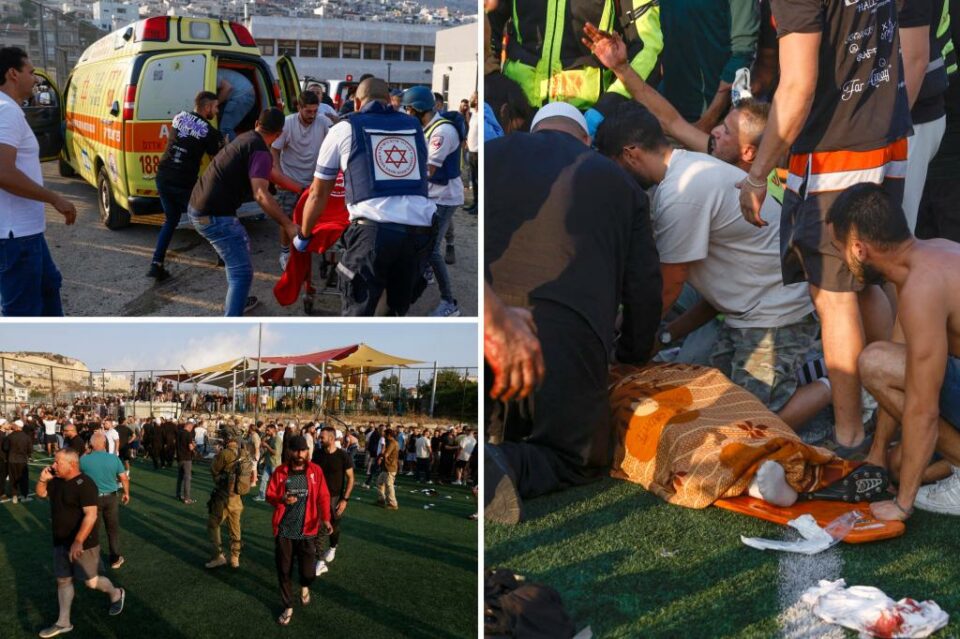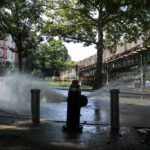Table of Contents
At least 12 individuals, mostly children and young people aged 10 to 20, were killed on Saturday by a Hezbollah rocket that landed in a soccer field in the Israel-controlled Golan Heights. This incident marks the deadliest attack on Israel since the October 7 massacre that triggered the war with Hamas. The targeted area was the northern Druze town of Majdal Shams, which has raised concerns about a potential escalation in the ongoing conflict.
Following the attack, Israeli leadership convened to assess the situation and determine an appropriate response. Foreign Minister Israel Katz stated that Hezbollah had crossed all red lines, and the Jewish state was now facing the prospect of an all-out war with the Lebanese terrorists. The minister also conveyed the expectation of a higher toll for Hezbollah due to their actions.
Israeli Prime Minister Benjamin Netanyahu, who was in Washington, D.C. at the time, returned to Israel and emphasized that the attack would not go unanswered. Netanyahu expressed solidarity with the families and the Druze community in this challenging time, affirming that this event will not be overlooked. He also highlighted that Israel would have full support from the United States and Europe when carrying out its response.
The attack, which resulted in up to 40 people injured and some in critical condition, was promptly denied by Hezbollah. However, the incident occurred shortly after an Israeli airstrike on Kfarkela in southern Lebanon, which further heightened tensions between the two parties. An Israeli Defense Forces statement attributed the attack to Hezbollah, which has been increasingly aggressive since the war with Hamas began.
What impact has the rocket attack had on the affected community, and what types of support are being provided?
Hezbollah Rocket Attack Kills 12, Mostly Children, in Deadliest Strike Since Oct. 7
On Tuesday, a Hezbollah rocket attack struck a residential neighborhood, killing at least 12 people – mostly children, in one of the deadliest strikes in the region since October 7. The attack has left the community devastated and raised international concerns about escalating violence in the area.
Details of the Attack
The attack occurred in a small village near the border with Lebanon, where a Hezbollah rocket struck a residential building, causing extensive damage and resulting in numerous casualties. The victims, mostly children, were innocent civilians who tragically lost their lives in the attack. The incident has sent shockwaves through the local community, sparking outrage and grief.
International Response
The international community has responded with condemnation and calls for an immediate ceasefire to prevent further loss of life. The United Nations has expressed deep concern over the escalating violence in the region, urging all parties to exercise restraint and work towards a peaceful resolution. The tragic loss of innocent lives has highlighted the urgent need for international intervention to bring an end to the conflict.
Impact on the Community
The deadly rocket attack has had a devastating impact on the affected community, leaving families shattered and traumatized by the loss of their loved ones. The local authorities have been overwhelmed by the scale of the tragedy, and efforts are underway to provide support and assistance to the affected families. The incident has underscored the urgent need for humanitarian aid and support for those impacted by the conflict.
Addressing the Root Causes
While the immediate priority is to provide aid and support to the affected community, efforts to address the root causes of the conflict are crucial in preventing further tragedies. It is imperative for all parties involved to engage in constructive dialogue and work towards a peaceful resolution that prioritizes the safety and well-being of civilians. The international community must play a proactive role in facilitating negotiations and promoting a lasting peace in the region.
Seeking Justice for the Victims
Amidst the grief and devastation, there is a growing call for justice for the victims of the rocket attack. It is essential for a thorough investigation to be conducted to ascertain the circumstances leading to the attack and hold those responsible accountable for their actions. Justice for the victims is paramount in bringing closure to the affected families and ensuring that such tragedies are not repeated in the future.
Conclusion
The Hezbollah rocket attack that claimed the lives of 12, mostly children, has left a deep scar on the affected community, prompting international concern and calls for a peaceful resolution. It is crucial for the international community to prioritize humanitarian aid and support for the affected families, as well as to actively pursue efforts to address the root causes of the conflict. The tragic incident serves as a stark reminder of the urgent need for lasting peace and stability in the region.
| Key Points | Details |
|---|---|
| Attack Location | Near the border with Lebanon |
| Number of Casualties | At least 12, mostly children |
| International Response | Condemnation and calls for ceasefire |
| Impact on Community | Devastating, with urgent need for humanitarian aid |
| Seeking Justice | Call for thorough investigation and accountability |
The victims of the attack were members of the Druze community, an ethnoreligious Arab minority in Israel, with some individuals listed in critical condition and receiving treatment at local clinics. Additionally, U.S. Congressman Ritchie Torres criticized Hezbollah’s sustained rocket attacks on Israel since the October 7 incident, explaining that the recent attack and the ongoing terror activities demonstrated the organization’s unrelenting aggression.
Israeli President Isaac Herzog mourned the tragedy and called out Hezbollah for its violent actions, attributing it to Iran’s influence. He underscored the need for Israel to protect its citizens and sovereignty in the face of such persistent threats and offered heartfelt prayers for the victims and the wounded.
Other Israeli political figures, including Culture and Sports Minister Miki Zohar and opposition leader Yair Lapid, demanded strong action against Hezbollah. The call for a resolute military response to Hezbollah’s aggression was reiterated by various senior officials, signaling a potential change in the direction of the ongoing war. Meanwhile, Lebanon’s government condemned the attack but stressed the need for a cessation of hostilities on all fronts.
In light of these events, a new round of peace talks has been scheduled in Rome, involving high-level officials from the U.S., Israel, and other key regional stakeholders. The talks aim to address the escalating tensions and seek to facilitate diplomatic solutions to the conflict.


